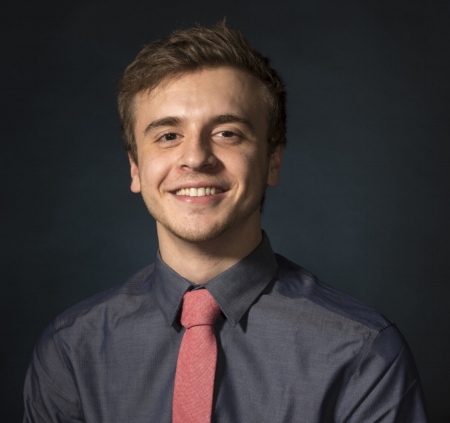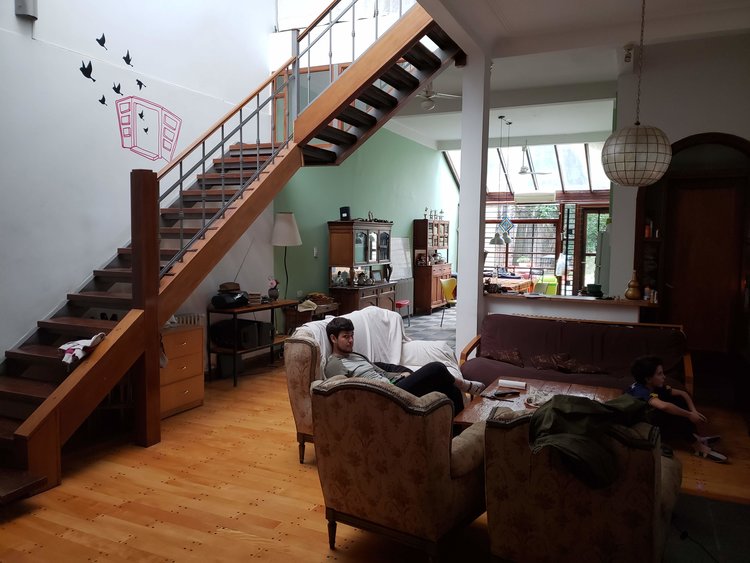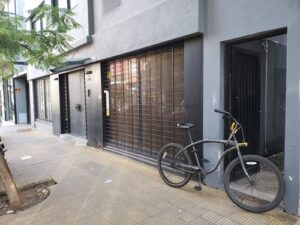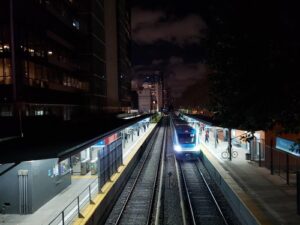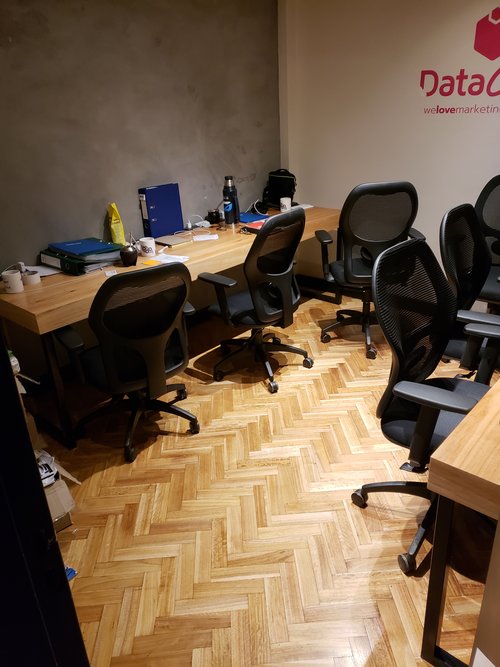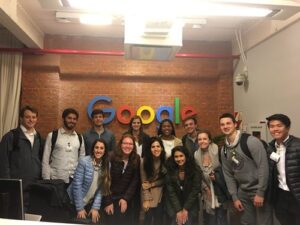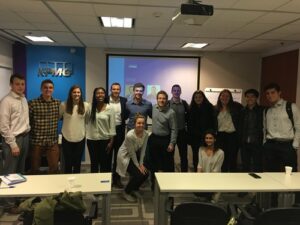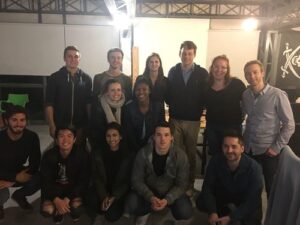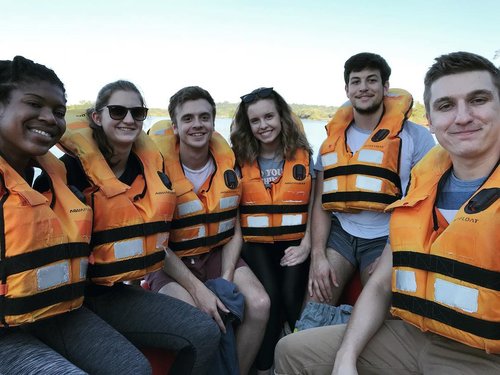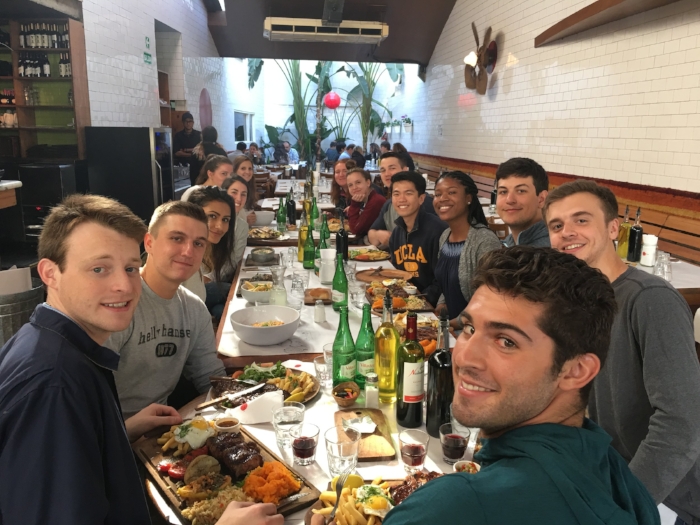WRITTEN BY SAGE CORPS SUMMER 2018 FELLOW, CASEY MATT.
Sage Corps’ first-ever cohort traveled to Buenos Aires, Argentina back in 2013. But what does a day in the life of a fellow look like in BA now? Casey, an Accounting major and Spanish minor at Michigan State University, has the inside scoop:
HOUSING
“I live in a homestay in Villa Crespo, a neighborhood in Buenos Aires. My homestay consists of a mother and her early-20s son, teenage daughter, and pre-teen son. The family also hosts two exchange students from Spain, as well as myself and another student from Sage Corps. If you think that sounds like a lot of people, there are also frequently guests over – friends of the kids, the mother, and the two students from Spain. There is always somebody to talk to while I’m at home.
If I ever come home from work and don’t have the energy to socialize, I can head over to my room, which basically is a bed+bath attached to a garage in the backyard. That also means that I don’t have any roommates, just housemates! I have a lot of privacy and complete silence whenever I need to sleep.
Most of my time at home I spend in the house with the family and housemates. On an average weekday I get home around 8pm and head to bed around 11pm. On the weekends, I am normally out in the city (when I’m not sleeping). The night life here takes place very late – it is normal to get to a bar around 1 or 2am and stay out until daylight!”
COMMUTING
“My commute takes me through Palermo, China Town, and Vicente Lopez. It is pretty long (anywhere from 40 minutes – 90 minutes) due to some unforeseen circumstances. My housing was decided before my startup changed at the last minute, meaning I live much farther away from work than the others in the cohort.
However, this does not bother me too much because most days I bike to work. The founder of my startup loaned his bike to me since he wasn’t using it, and I love commuting on it because I get some exercise and can see some of the city at the same time. It takes an equal amount of time (or less!) as it would to take public transit, and I get to see new things every day while feeling much more connected to the city.
Sometimes if the weather is bad or I have somewhere to go after work, I take public transit. For me, that means a ~25 minute train and a ~30 minute bus ride. The buses here are unpredictable – you might wait 30 minutes for a certain bus, and then see three of them pull up right behind each other all at once. During rush hour the train and buses are packed. I’ve never gotten a seat during rush hour, but it really depends on which bus routes you decide to take. There is a great app to help you use public transit here called Como Llego. It was created by the government and makes getting around the city super easy.”
WORKING
“I work at an e-commerce startup called Checkars. It is a young startup and growing quickly. When I started, the team was 3 people and will turn into 8 by the time I leave. For most of the summer we have worked at a co-working space called La Maquinita in Vicente Lopez, a neighborhood on the north side of Buenos Aires. Out of the Buenos Aires 2018 cohort, my location is definitely the most remote. The space itself is a small room that cannot hold all of us at once, so we will be moving into a bigger office space dedicated to us at the end of the summer. Every day a few members of the team and I go to the local “Comida por peso” – a buffet-style lunch place that prices your meal by its weight and is extremely cheap. After work, the team sometimes organizes happy hours and other events, like a casual soccer game.”
STARTUP LIFE
“The mission of Checkars is to make the buying and selling of used cars in Argentina more convenient, transparent, and secure. The team is developing a platform to accomplish this goal, and my role here is focused on the pricing aspect of the business – gathering insights from our database of used car information and then working to price vehicles accordingly. I use Excel and SQL to complete most of my work and have been given various projects over the summer. These projects include serving as the lead contact with our development team in India, quality-checking the data output, generating “campaigns” (lists of vehicles at good value that match our requirements) for sourcing, investigating competitors in the market, and working to build an algorithm to price cars automatically based on their specifications.”
AFTER WORK
“After work, I usually stop at any one of a kiosko (convenience store), fruterÃa (fruit stand), or farmacÃa (pharmacy) if I need to stock up on anything. Because I normally leave work around 7-8pm, I get home around 8-9pm. The culture here is to eat dinner very late – my host family usually has dinner for us prepared around 9pm, but I’ve heard some families eat as late as 11pm. On weeknights I talk for a while with the family and my housemates before bed, and then on the weekends the cohort here usually tries to go out to a bar/club or arrange a trip somewhere. We’ve gotten to be great friends and have been able to share some very cool experiences together (if you get a chance, go to Iguazu Falls!) There are a lot of fun things to do in BA if you’re willing to do a little research. Some weeknights will include leaving work a bit early to attend an event arranged by Sage Corps. We have had events at big companies like IBM, Google, and KPMG, and also events with growing startups like Adtomic and Realtrends.”
WEEKLY PROGRAMMING
“If I had to pick a favorite program event so far, it would be our event at KPMG. All of the events have been interesting and a great chance to learn from smart people, but KPMG was the best in that regard. We spoke with Alan Lerner, who was such an entertaining and knowledgeable guy, and everybody came out of that event knowing a ton more about management consulting.
On a related note, our city managers in Buenos Aires have been the best part of the program. Juan and Mili are two of the most friendly, helpful, and intelligent people here. I wasn’t sure how easy it would be to adapt to living and working in Buenos Aires, but they provided great support and made the transition easy. The city managers are also the ones responsible for arranging our events, and they clearly have done a great job in that regard as well.”
WEEKENDS
“On the weekends our cohort tries to get together to either go out or arrange a trip somewhere. The night life culture here is tough to get used to – it is normal to arrive to a bar or club around 1am and then stay out until 6 or 7am. That means catching up on a lot of sleep the next day! During the rest of the weekend, I try to get out of the house and explore the city by trying new restaurants and going new places. It can be a bit draining, but after I remember I am only here for eight weeks, I realize that I don’t want to waste any time!
Our cohort has also arranged trips to Uruguay, Iguazu Falls, and Salta. There are some incredible sights to see in Argentina and the Southern Cone region of South America if you have the time and the funds. Flybondi is a new, low-cost airline in Argentina (think Spirit Airlines in the US), and is a good option for these types of weekend trips. In my opinion, even if you don’t get a chance to get outside the city, you’ll still have so much to do and come home with an extremely fulfilling experience.”
WHAT SURPRISED YOU MOST?
“The thing that has most surprised me about my Sage Corps experience is how similar it really is to the United States. Working in a big city like Buenos Aires requires some getting used to, but at the end of the day, you are still working in a city and with other human beings. You are still using public transit and still have the same amenities as you do at home. You are still spending time with friends and still doing what you do at home. The difference here is that you get to enjoy an entirely different culture here and really immerse yourself into it. In my opinion, working abroad is much different than a vacation abroad in that respect, because you get to truly feel what it is like to live here and be a part of the city.”
ADVICE
“My advice for future fellows is to do whatever you need to do to hit the ground running. At the end of the day, this program is here to give you a unique work experience. All of the extracurricular activities and trips are a part of it, but not the focus. The focus is the work experience you will obtain, and working at a startup gives you the opportunity to have a real impact. Do some preparation beforehand and really learn about your startup’s industry, their history, and their competitors. If you know you will be using technical skills, make sure they are sharp. Think about what you want to get out of this experience (a network? applicable skills? experience doing something new?) and then make a consistent effort to get it throughout your internship, because nobody is going to do it for you. Work to anticipate the needs of your projects because that will allow you to make every day at work productive. You only get eight weeks to make an impact, and you want it to be as big as possible.”
Want to see more from Casey and the Summer 2018 Buenos Aires cohort? Check out their Instagram, @sc.buenosaires_!


